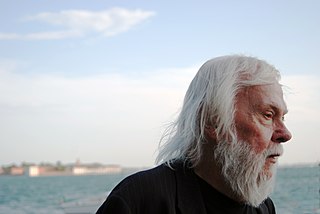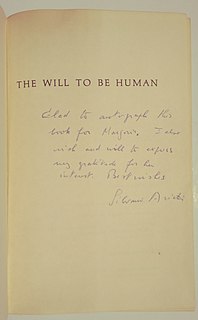A Quote by Sydney Pollack
With a movie you're creating from the beginning this particular work, let's not call it work of art, because very few movies are works of art, let's just call them bits of popular culture, whatever they are, sometimes very rarely by accident a movie becomes a work of art.
Related Quotes
Now the time comes that I decided I only will do art films, basically. In a way, very similar to Isabella Rossellini. I prefer to work only with people like Lars von Trier or Guy Maddin or Gus Van Sant, just to name a few. But also there's bills to pay, and sometimes you have to make a movie. So my decision from now on is art movies, or movies which are commercial, but for real money. That is my decision.
I always felt that my work hadn't much to do with art; my admirations for other art had very little room to show themselves in my work because I hoped that if I concentrated enough the intensity of scrutiny alone would force life into the pictures. I ignored the fact that art, after all, derives from art. Now I realize that this is the case.
I believe Picasso's success is just one small part of the broader modern phenomenon of artists themselves rejecting serious art- perhaps partly because serious art takes so much time and energy and talent to produce-in favor of what I call `impulse art': art work that is quick and easy, at least by comparison.
What is it about a work of art, even when it is bought and sold in the market, that makes us distinguish it from . . . pure commodities? A work of art is a gift, not a commodity. . . works of art exist simultaneously in two “economies”, a market economy and a gift economy. Only one of these is essential, however: a work of art can survive without the market, but where there is no gift, there is no art.
In most modern instances, interpretation amounts to the philistine refusal to leave the work of art alone. Real art has the capacity to make us nervous. By reducing the work of art to its content and then interpreting that, one tames the work of art. Interpretation makes art manageable, conformable.
The concept of who your audience is becomes more important than your site. Sometimes you can be commissioned to do a piece in Strasburg, and it works. Sometimes you're commissioned to do a piece somewhere else and it doesn't work, but then it moves to another city, the people embrace it, and becomes part of them. You just misjudged the needs of the people. Art is about giving people material and things to work with to fulfill whatever needs they have.
The idea was to take fine art and put it into the location of the movie scripts. The script itself is collage - some of the lines come from actual movies and I've written others to make the text work with the found image. In this way, the details of old dead guys' paintings (from the collection of the Städel Museum in Frankfurt, where this work will be exhibited in relation to the historical paintings) become illustrations of the movie scripts. I found this mélange of high art and Hollywood amusing.
Popular success is a wonderful gift if it happens, but like money, it's not the motivation. The effort to create a work of art that is true and potentially lasting, that is the very best work of art you can create at that point in your life - a book that may only reach or move a few people but will seem to people somehow transformative. That's the ideal; that's always the motivation.
All of my movies are about how I wish the world would work. I've made very few movies about how the world worked. I could name them on one and a half hands, about how my movies have been very reflective of how the world was exactly. A lot of my movies are really about the way I wish the world was, and that's what this whole art form is all about. It's an interpretive art form.
The person who appreciates a great work of art has the feeling that the work grows in him as he becomes involved in a prolonged capturing of emerging marginal meanings. He feels that he, too, is creative, that he himself is adding to his experience and understanding. Moreover, he wants to confront the work of art many times. He is not easily tired of it, as he would be had he read a purely logical statement. He realizes that the work of art does not merely transmit information; it produces pleasure.





































